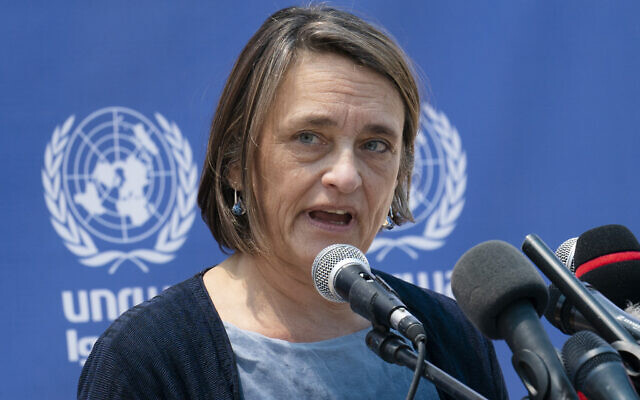This latest retaliation against the United Nations official comes two days after the UN’s Humanitarian Coordinator issued a statement outlining the ways Israel has impeded access to aid and ahead of an earlier warning.
Israel’s Foreign Minister, Eli Cohen, announced today via X that he revoked Lynn Hastings’ visa, confirming the move the occupying country told the United Nations it would do last Friday after accusing Hastings of being biased.
Citing what Cohen called “UN bias,” Cohen further accused Hastings via X of failing to “condemn Hamas for the brutal massacre of 1,200 Israelis, for the kidnapping of babies and the elderly.”
Two days ago, Hastings published a statement, in which she described the “hellish” scenario unfolding in Gaza.
“The conditions required to deliver aid to the people of Gaza do not exist,” she said.
According to Hastings, the resumption of Israel’s bombardment of the Gaza Strip and Israeli forces expanding their operations into Southern Gaza have created a situation where “nowhere is safe in Gaza and there is nowhere left to go.”
She further outlined the humanitarian crisis in detail, including how Israel has forcibly moved tens of thousands to “increasingly compressed areas, desperate to find food, water, shelter and safety.”
“The UN stands ready to work with all parties to expand the number of UN-managed safe shelters and to deliver assistance where it is needed,” Hasting’s statement concluded.
UN Secretary General António Guterres appointed Hastings as Deputy Special Coordinator for the Middle East Peace Process in December 2020, where she works alongside UN OCHA to meet the humanitarian needs of Palestinians, especially during crisis periods.
Israel has previously threatened the UN with visa revocations. Just weeks after Israel began its onslaught of the Gaza strip on October 7, Gilad Erdan, Israel’s Permanent Representative to the UN, told Israeli media on October 25 that “the time has come to teach them a lesson” by denying visas to officials.
Erdan’s comments followed a high-level UN Security Council meeting held the day before on October 24 where Secretary General Guterres told the UN Security Council he was “deeply concerned about the clear violations of international humanitarian law that we are witnessing in Gaza.”.
“Protecting civilians does not mean ordering more than one million people to evacuate to the south, where there is no shelter, no food, no water, no medicine and no fuel, and then continuing to bomb the south itself,” Guterres added.
Qatar quells UNRWA funding gap
On December 4, Qatar’s Ministry of Foreign Affairs announced it had entered a two-year contribution agreement with the UN’s Relief and Works Agency for Palestine Refugees, otherwise known as UNRWA.
In a communique posted via X on December 4, MoFA said their QR 65.7 million ($18 million) pledge for 2023 and 2024 to UNRWA was made in order to “contribute to bridging the agency’s funding gap” and “to support the brotherly Palestinian people.”
The UN’s ability to receive and distribute a wide variety of needed aid to Palestinians has been “significantly impaired” by Israel’s resumption of hostilities, according to a UN OCHA report released on Wednesday. .
“On 5 December, for the third consecutive day, Rafah was the only governorate in Gaza where limited aid distributions took place. In the adjacent Khan Younis governorate, aid distribution largely stopped due to the intensity of hostilities,” the report added.
Since Israeli hostilities renewed on December 1 and until December 5, Gaza’s Ministry of Health estimates that over 1,200 Palestinians have been killed, with at least 70% of the casualties being women and children. Approximately 85% of the Gaza Strip’s population are now internally displaced persons, according to UNRWA.







